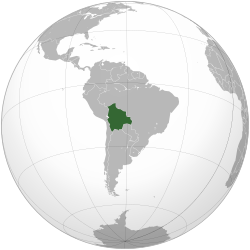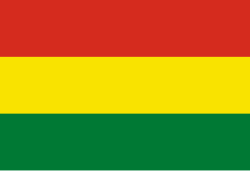

The following outline is provided as an overview of and topical guide to Bolivia:
Contents
- General reference
- Geography of Bolivia
- Environment of Bolivia
- Regions of Bolivia
- Demography of Bolivia
- Government and politics of Bolivia
- Branches of government
- Foreign relations of Bolivia
- Law and order in Bolivia
- Military of Bolivia
- Local government in Bolivia
- History of Bolivia
- Culture of Bolivia
- Art in Bolivia
- Sports in Bolivia
- Economy and infrastructure of Bolivia
- Education in Bolivia
- Health in Bolivia
- See also
- References
- External links
Bolivia – landlocked sovereign country located in central South America. It is bordered on the north and the east by Brazil, on the southeast by Paraguay, on the south by Argentina, and on the west by Chile and Peru. [1] Its geography varies from the peaks of the Andes mountains to the tropical forests of the Amazon Basin. It is a developing country, and its main economic activities include agriculture, mining, and manufacturing of products such as textiles.




